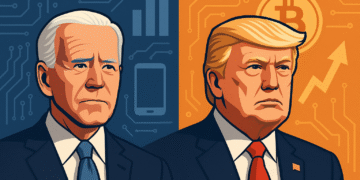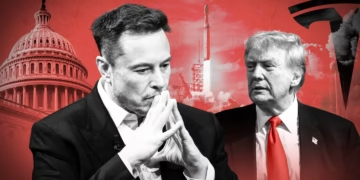The U.S. tech sector is a significant contributor to the economy, with advancements in AI, semiconductors, and data centers driving innovation and growth. As the 2025 election approaches, understanding the potential impact of Biden’s and Trump’s policies on tech and crypto is crucial for investors and companies.

The current regulatory framework for crypto includes guidelines from the IRS, SEC, and stablecoin regulations. The White House has also taken steps, such as establishing the Strategic Bitcoin Reserve and U.S. Digital Asset Stockpile, as noted in a Fact Sheet from March 6, 2025.
As the election draws near, the U.S. tech market regulation and cryptocurrency regulation are set to be shaped by the outcome. The policies of Biden and Trump will have a significant impact on the future of tech and crypto.
Key Takeaways
- The U.S. tech sector is a major economic driver, with advancements in AI, semiconductors, and data centers.
- The current regulatory framework for crypto includes IRS, SEC, and stablecoin guidelines.
- The 2025 election will significantly impact U.S. tech market regulation and cryptocurrency regulation.
- Biden and Trump’s policies will shape the future of tech and crypto.
- Understanding these policies is crucial for investors and companies.
The Current Tech and Crypto Landscape in 2025
The current landscape of tech and cryptocurrency in 2025 is marked by innovation and regulatory challenges. The U.S. tech sector is experiencing significant growth, driven by advancements in areas such as AI, semiconductors, and data centers.
State of the U.S. Tech Sector
The U.S. tech industry continues to be a global leader, with notable advancements in AI and semiconductor technology. Companies are investing heavily in research and development, driving innovation forward.
Key Areas of Growth:
- Artificial Intelligence: AI is being integrated into various sectors, from healthcare to finance.
- Semiconductors: The demand for advanced semiconductors is on the rise, driven by AI, 5G, and IoT.
- Data Centers: With the increase in cloud computing, data centers are becoming more critical.
Cryptocurrency Market Overview
The cryptocurrency market is evolving, with increasing adoption and regulatory scrutiny. The market is seeing a mix of established players and new entrants.
| Cryptocurrency | Market Cap (Billion USD) | 24h Change (%) |
|---|---|---|
| Bitcoin | 450 | 2.5 |
| Ethereum | 220 | 1.8 |
| Other Cryptocurrencies | 180 | 3.2 |
Regulatory Framework in Place
The regulatory landscape for tech and cryptocurrency is becoming more defined. Key regulatory bodies include the IRS and SEC.
SEC Press Release No. 2025-30 highlights the formation of a new Crypto Task Force, indicating a more stringent regulatory environment for cryptocurrencies.
The current regulatory framework includes guidelines on stablecoin regulations and digital asset taxation policies, shaping the future of the industry.
Global Context: U.S. Policy Influence on International Markets
The U.S. plays a pivotal role in shaping global tech policies, with its regulatory decisions having far-reaching implications for international markets. As the global tech landscape continues to evolve, understanding the U.S. policy influence is crucial for stakeholders across the tech spectrum.
The global tech industry is increasingly interconnected, with U.S. policies affecting not just domestic markets but also international trade and technological innovation. The White House’s recent initiative, “Strengthening American Leadership in Digital Financial Technology” (Jan 23, 2025), underscores the U.S. commitment to maintaining its leadership in digital finance and technology.
International Regulatory Cooperation
One of the key aspects of U.S. policy influence is international regulatory cooperation. The U.S. works closely with international bodies to establish common standards and regulations for emerging technologies like blockchain and AI. This cooperation is vital for:
- Creating a level playing field for tech companies operating globally
- Addressing cross-border challenges such as data privacy and cybersecurity
- Fostering innovation while ensuring regulatory compliance

Competition with China and Other Tech Powers
The U.S. is not alone in shaping global tech policies; it faces significant competition from other tech powers, particularly China. The ongoing tech rivalry between the U.S. and China has implications for global markets, innovation, and security.
Key areas of competition include:
- 5G Expansion: The race for 5G dominance is not just about market share but also about securing national security interests.
- AI Development: Both countries are investing heavily in AI research and development, with significant implications for future technological advancements.
- Blockchain Innovation: The development of blockchain technology is a critical area where both the U.S. and China are vying for leadership.
As the global tech landscape continues to evolve, the interplay between U.S. policy influence, international regulatory cooperation, and competition with other tech powers will remain a critical factor shaping the future of technology and international markets.
Biden Crypto Policy2025 Trump Tech Regulation2025 Crypto Market Impact Biden
As the 2025 presidential election approaches, the cryptocurrency industry is bracing for potential policy shifts under either a Biden or Trump administration. The divergent approaches of Biden and Trump to crypto regulation are expected to have significant implications for the tech industry and cryptocurrency market.
Key Policy Differences at a Glance
Biden’s crypto policy is anticipated to focus on regulation and oversight, aiming to protect investors and maintain financial stability. In contrast, Trump’s approach is seen as more deregulatory, potentially leading to a more favorable environment for crypto innovation.
| Policy Area | Biden’s Approach | Trump’s Approach |
|---|---|---|
| Crypto Regulation | Stricter oversight and regulation | Deregulation and less oversight |
| Tech Industry Oversight | Enhanced antitrust measures | Reduced regulatory burdens |
| Cryptocurrency Market Impact | Potential short-term volatility due to regulation | Possible long-term growth with less regulation |
“The outcome of the 2025 election will be crucial for the crypto industry. A Biden administration will likely bring more regulation, while a Trump administration could mean less oversight,” said a leading crypto analyst.
Potential Market Reactions to Policy Approaches
The cryptocurrency market is likely to react differently to the policy approaches of Biden and Trump. Under Biden, the market may experience short-term volatility due to increased regulation. Conversely, Trump’s deregulatory stance could lead to long-term growth.
Silicon Valley’s Response to Election Scenarios
Silicon Valley is closely watching the election outcomes, as they significantly impact the tech industry. A Biden administration is expected to bring stricter regulations, which could be challenging for some tech companies. On the other hand, a Trump administration might offer a more business-friendly environment.
The tech industry’s response will be crucial in shaping the future of crypto and tech policies in the U.S. As the election approaches, companies are preparing for potential shifts in regulatory landscapes.
Biden’s Tech Policy Vision for 2025
In 2025, Biden’s tech policy is expected to prioritize regulation, oversight, and the promotion of clean energy innovation. This approach aims to balance the need for technological advancement with consumer protection and environmental sustainability.

AI Regulation and Ethical Guidelines
The Biden administration is anticipated to push for comprehensive AI regulation, focusing on ethical guidelines that ensure AI systems are transparent, accountable, and fair. This includes measures to prevent bias in AI decision-making and to promote the development of AI that aligns with human values.
Key aspects of AI regulation will likely include:
- Transparency in AI decision-making processes
- Accountability mechanisms for AI-related errors
- Standards for AI safety and security
Antitrust and Big Tech Oversight
Biden’s tech policy vision includes a strong stance on antitrust enforcement, aiming to prevent monopolistic practices and promote competition in the tech industry. This involves scrutinizing the activities of big tech companies and taking action against anti-competitive behavior.
The administration is expected to:
- Enhance scrutiny of mergers and acquisitions in the tech sector
- Implement stricter regulations on data privacy and security
- Promote interoperability and open standards in technology
Net Neutrality and Digital Infrastructure
Restoring net neutrality rules is a key component of Biden’s tech policy agenda. This involves ensuring that internet service providers do not discriminate against certain types of online content, thereby maintaining a level playing field for all internet users and content providers.
Investing in digital infrastructure is also a priority, with a focus on expanding access to high-speed internet, particularly in underserved communities.
Climate-Tech Incentives and Clean Energy Innovation
Biden’s tech policy vision for 2025 includes significant incentives for climate-tech innovation, aiming to accelerate the development and deployment of clean energy technologies. This involves providing financial incentives, tax credits, and other forms of support for companies and researchers working on climate-related tech projects.
The administration plans to:
| Initiative | Description | Expected Outcome |
|---|---|---|
| Clean Energy Research Grants | Funding for research into new clean energy technologies | Accelerated development of clean energy solutions |
| Climate-Tech Tax Credits | Tax incentives for companies investing in climate-tech | Increased investment in climate-tech innovation |
Biden’s Approach to Cryptocurrency Regulation
As Biden’s administration takes a closer look at cryptocurrency, new regulatory measures are on the horizon. The administration is expected to take a cautious stance on crypto, focusing on regulating the industry while promoting innovation.
SEC Enforcement Under Gary Gensler
The Securities and Exchange Commission (SEC) under Gary Gensler’s leadership is likely to play a crucial role in shaping cryptocurrency regulation. The SEC has been actively enforcing regulations on digital assets, and this trend is expected to continue.
- Enhanced scrutiny of crypto exchanges and trading platforms
- Increased focus on investor protection
- Stricter guidelines for Initial Coin Offerings (ICOs)
Central Bank Digital Currency Development
The Biden administration is expected to support the development of a Central Bank Digital Currency (CBDC). A CBDC could offer a more stable and secure alternative to existing cryptocurrencies.
Key benefits of a CBDC:
- Reduced volatility
- Increased financial inclusion
- Improved monetary policy implementation
Stablecoin Regulatory Framework
The administration is also likely to introduce a regulatory framework for stablecoins. Stablecoins are cryptocurrencies pegged to the value of a traditional currency, and their regulation is crucial for maintaining financial stability.
The SEC has already issued a statement on stablecoins, highlighting the need for clear guidelines.
Digital Asset Taxation Policies
Digital asset taxation is another area that is expected to see significant developments under Biden’s administration. The IRS is likely to introduce clearer guidelines on the taxation of cryptocurrencies.
Key considerations for digital asset taxation:
- Classification of digital assets for tax purposes
- Reporting requirements for crypto transactions
- Tax implications of crypto-to-crypto trades
Trump’s Tech Industry Stance
The Trump administration’s tech policy is characterized by its pro-business stance, focusing on deregulation and promoting American tech companies. This approach is expected to have a significant impact on the tech industry, influencing everything from innovation to international competition.
Deregulation Agenda for Technology Companies
Trump’s deregulation agenda aims to reduce the regulatory burden on tech companies, allowing them to invest more in research and development. By minimizing federal oversight, the administration hopes to foster a more competitive tech sector.
Key areas of deregulation include reducing compliance costs for startups and simplifying the process for tech companies to expand their operations.

Social Media and Content Moderation Policies
The Trump administration has been vocal about its concerns regarding social media censorship. Trump’s policies aim to ensure that social media platforms do not unfairly censor conservative voices.
This involves revisiting Section 230 of the Communications Decency Act, which currently provides immunity to online platforms for content posted by their users.
National Security and Technology
National security remains a top priority for the Trump administration, particularly in the context of emerging technologies like AI and 5G.
The administration is working to ensure that American tech companies are not hindered by regulations that could compromise national security.
5G Expansion and Digital Infrastructure
Trump’s tech policy also emphasizes the importance of expanding 5G infrastructure across the United States.
By promoting American companies and reducing regulatory barriers, the administration aims to make the U.S. a leader in 5G technology.
Trump’s Cryptocurrency and Blockchain Vision
Trump’s cryptocurrency and blockchain agenda is set to reshape the regulatory environment in2025. With a focus on promoting innovation and limiting federal oversight, Trump’s administration is expected to take a more supportive stance on crypto and blockchain technology.
Approach to Federal Oversight of Digital Assets
Trump’s approach to federal oversight is centered around creating a conducive environment for cryptocurrency and blockchain innovation. This involves reducing regulatory hurdles and allowing for more flexibility in the development and implementation of digital assets.
The establishment of the Strategic Bitcoin Reserve and United States Digital Asset Stockpile, announced on March 6,2025, is a significant step in this direction. This move is expected to bolster the U.S. position in the global digital asset market.
Position on CBDCs vs. Private Cryptocurrencies
Trump’s stance on Central Bank Digital Currencies (CBDCs) versus private cryptocurrencies is nuanced. While CBDCs offer stability and are backed by the government, private cryptocurrencies provide innovation and decentralization. Trump’s administration is likely to support a balanced approach, allowing both to coexist and thrive.
Blockchain Innovation and Development
Blockchain technology is at the heart of Trump’s crypto vision. By promoting blockchain innovation, the administration aims to drive technological advancement and economic growth. This includes supporting startups and encouraging the development of new blockchain-based applications.
Potential Appointees and Their Crypto Stances
The appointment of key officials with a deep understanding of cryptocurrency and blockchain technology is crucial. Trump’s potential appointees are expected to have a favorable view of crypto and be supportive of innovation in this space. Their stances on crypto regulation and enforcement will be critical in shaping the future of the industry.
How Policy Differences Could Impact Investors and Companies
Investors and companies are bracing for potential shifts in tech and crypto markets as the policy differences between Biden and Trump come into focus. The divergent approaches to regulation, innovation, and market oversight will likely have far-reaching implications for tech stocks, cryptocurrency investments, and the overall startup environment.

Tech Stock Outlook Under Different Administrations
The tech stock market is expected to react differently under Biden and Trump’s policies. Biden’s focus on regulation and antitrust could lead to a more stable tech industry, potentially boosting investor confidence in established companies.
On the other hand, Trump’s deregulatory agenda might spur innovation and growth among tech companies, particularly in areas like AI and 5G. However, this could also lead to increased volatility as companies navigate changing regulatory landscapes.
“The regulatory environment will play a crucial role in shaping the tech industry’s future. Investors need to stay informed about policy shifts to make strategic decisions.”
Cryptocurrency Investment Strategies
Cryptocurrency investment strategies will also be influenced by the policy differences between Biden and Trump. Biden’s approach to cryptocurrency regulation, which includes stricter oversight and potentially a central bank digital currency (CBDC), could lead to a more secure and transparent crypto market.
In contrast, Trump’s stance on cryptocurrency might favor a more laissez-faire approach, potentially leading to increased market speculation and volatility.
- Investors may need to diversify their portfolios to mitigate risks associated with regulatory changes.
- Staying abreast of policy developments will be crucial for making informed investment decisions.
Startup and Innovation Environment
The startup environment is another area that will be significantly impacted by the policy differences between Biden and Trump. Biden’s climate-tech incentives could spur innovation in clean energy and sustainability, creating new opportunities for startups in these sectors.
Meanwhile, Trump’s focus on deregulation could benefit startups by reducing compliance costs and fostering a more business-friendly environment.
| Policy Area | Biden’s Approach | Trump’s Approach |
|---|---|---|
| Tech Regulation | Stricter oversight, antitrust enforcement | Deregulation, business-friendly environment |
| Cryptocurrency | Stricter regulation, potential CBDC | Laissez-faire approach, less oversight |
| Climate-Tech | Incentives for clean energy innovation | Less emphasis on climate-tech incentives |
Understanding these policy differences is crucial for investors and companies to navigate the evolving tech and crypto landscape. By staying informed and adapting to the changing regulatory environment, stakeholders can make strategic decisions to mitigate risks and capitalize on emerging opportunities.
Conclusion: Preparing for Policy Shifts in Tech and Crypto
As the 2025 election approaches, the tech and crypto markets are bracing for potential policy shifts that could significantly impact their trajectories. The contrasting visions of Biden and Trump for the tech and crypto sectors underscore the need for investors and companies to prepare for change.
Understanding the implications of different policy approaches is crucial for navigating the evolving regulatory landscape. Crypto investor sentiment in 2025 will likely be influenced by the outcome of the election and the subsequent direction of U.S. digital asset policies.
To adapt to the changing environment, stakeholders must stay informed about the policy differences and their potential market reactions. By doing so, they can make informed decisions and position themselves for success in a landscape shaped by the policy shifts in tech and crypto.
FAQ
What are the key differences between Biden’s and Trump’s crypto policies?
Biden’s approach is expected to focus on regulation and oversight, while Trump’s approach may be more deregulatory, potentially leading to a more supportive stance on crypto and blockchain.
How might the 2025 U.S. election impact the cryptocurrency market?
The election outcome could significantly influence the cryptocurrency market, with Biden’s administration potentially leading to stricter regulations and Trump’s administration potentially resulting in a more favorable environment for crypto innovation.
What is the current regulatory framework for crypto in the U.S.?
The current regulatory framework includes guidelines from the IRS, SEC, and stablecoin regulations, which are shaping the industry and influencing the development of digital assets.
How could Biden’s tech policy vision impact AI regulation?
Biden’s administration is expected to prioritize AI regulation, focusing on ethical guidelines and promoting innovation while protecting consumers.
What is Trump’s stance on federal oversight of digital assets?
Trump’s approach is expected to be more deregulatory, potentially limiting federal oversight of digital assets and promoting a more favorable environment for blockchain innovation.
How might the policy differences between Biden and Trump impact tech stocks?
The policy differences between Biden and Trump could significantly impact tech stocks, with investors needing to adapt to changing regulatory landscapes and potential market shifts.
What are the implications of a CBDC (Central Bank Digital Currency) for the crypto market?
A CBDC could potentially impact the crypto market by providing a more stable and regulated alternative to private cryptocurrencies, potentially influencing market trends and investor sentiment.
How could the 2025 election outcome affect the startup and innovation environment?
The election outcome could significantly impact the startup and innovation environment, with a more favorable regulatory environment potentially leading to increased investment and innovation in the tech sector.
What is the role of Silicon Valley in shaping the tech policy agenda?
Silicon Valley plays a significant role in shaping the tech policy agenda, with tech companies and industry leaders influencing policy decisions and advocating for their interests.
How might the policy approaches of Biden and Trump impact international regulatory cooperation?
The policy approaches of Biden and Trump could influence international regulatory cooperation, with a more collaborative approach potentially leading to greater global coordination on tech and crypto regulations.




















































